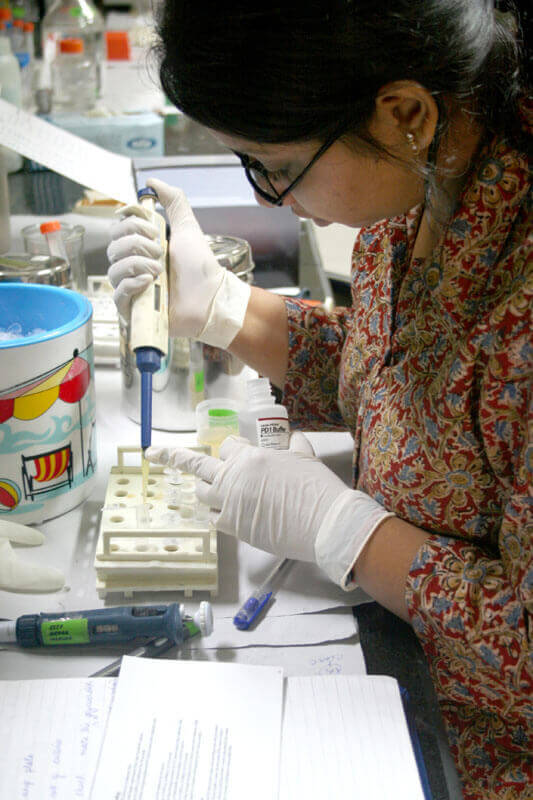The development of new diagnostic, treatment, and prevention products is fundamental to accelerating the decline of the global tuberculosis (TB) burden,
panelists from the World Health Organization (WHO), the National Institutes of Health (NIH), and the Bill & Melinda Gates Foundation agreed on
during a panel discussion hosted by the Center for Strategic and International Studies (CSIS) on Monday.

- CSIS panelists say R&D is fundamental to meeting new global TB targets. Photo: PATH/Satvir Malhotra
CSIS hosted the panel on the occasion of the release of its summary report Strategic US Leadership – Essential to Address the Global Tuberculosis Pandemic—which
examines US approaches to tackling TB both in the United States and abroad. The report concludes that the United States needs to better lead, coordinate,
and prioritize its TB efforts, as well as increase fiscal and other resources devoted to the issue. Among its recommendations, the report encourages
the United States to create robust, long-term research partnerships with key institutions in select emerging economies to promote the discovery and
development of new TB tools.
During the panel discussion, Dr. Mario Raviglione—director of the global TB program at WHO—discussed the ambitious TB targets put forward in
a World Health Assembly resolution including the goal of achieving 95 percent reduction in TB deaths by 2035. He noted that the model for achieving
this target assumes the introduction of new TB diagnostics, medicines, or vaccines and said achieving this target will not be possible without investments
in research and development (R&D) that result in the introduction of new interventions.
The panelists agreed that while the United States will continue to drive efforts toward the development of new TB tools, middle-income countries and rising
economies also have an important role to play as well. Dr. Peter Small—deputy director of the TB program at the Gates Foundation—noted
that many of these emerging economies also have high TB disease burdens so they are uniquely positioned to contribute. Dr. Small said he believes that
it is important for these nations to increase their R&D capacity and investments in science and that US leadership in fostering R&D capacity
within these nations will prove key to the long-term development of more frugal and locally-viable TB products.
Dr. Tony Fauci—director of the National Institute of Allergy and Infectious Diseases at NIH—agreed with Dr. Small’s statements regarding the
need to forge TB partnerships and collaborations with our emerging economy partners. As an example of successful collaborations, he mentioned the increased
use of co-principal investigator projects, where a researcher form the United States and a researcher from a different country collaborate on a research
project with each of their home countries providing part of the funding.
The panelists discussed not only the need for improved collaboration and coordination with other nations, but also the need for enhanced coordination within
the United States. Dr. Fauci said while he believes there should be a concerted, coordinated R&D effort by the US government, it needs to be approached
carefully. He said he believes fundamental research at the early stages needs to remain somewhat spontaneous, but that he sees a need for greater coordination
downstream.
A common theme throughout the discussion was the lack of adequate financial resources to meet the demands of a growing and complicated pandemic. Dr. Fauci
mentioned the decreasing purchasing power NIH now as a result of stagnated federal funding over the last few years. He noted that as a result, NIH
has less flexibility to jump on promising TB research. Dr. Fauci said he believes our country needs to reevaluate how we think about biomedical innovation
and research funding—arguing that the US research budget should not be thought of as discretionary funding, but rather an item that needs to
be automatically increased each year like cost of living increases.
Panelists were also asked to consider the best arguments to convince US policymakers to increase investment in R&D for TB. Dr. Fauci said advocates
should talk about how we live in a global community in which we can’t think of it as “our disease versus their disease”—that the United States
has an economic and security interest in tackling TB. He also said the TB community should not see HIV as a source of competition for funding, but
rather hold it up as an example of the impact that can be realized as a result of robust investments throughout the development process. Dr. Raviglione
agreed, noting that within just a few years of the emergence of the AIDS epidemic, the world had already developed diagnostic tests and a few years
later developed antiretroviral treatments. Dr. Raviglione said this is a very visible example of the results that can be achieved for a disease through
strong investment in R&D.

